
AICN COMICS: Q&@ is our new semi-weekly interview column where some of your favorite @$$Holes interview comic bookdom’s biggest, brightest, newest, and oldest stars. Enjoy this latest in-depth interview filled with @$$y goodness and be sure to join the rest of your favorite @$$Holes for their opinions on the weekly pull every Wednesday with AICN COMICS REVIEWS!
@’s by ECHOES Writer
Joshua Hale Fialkov!
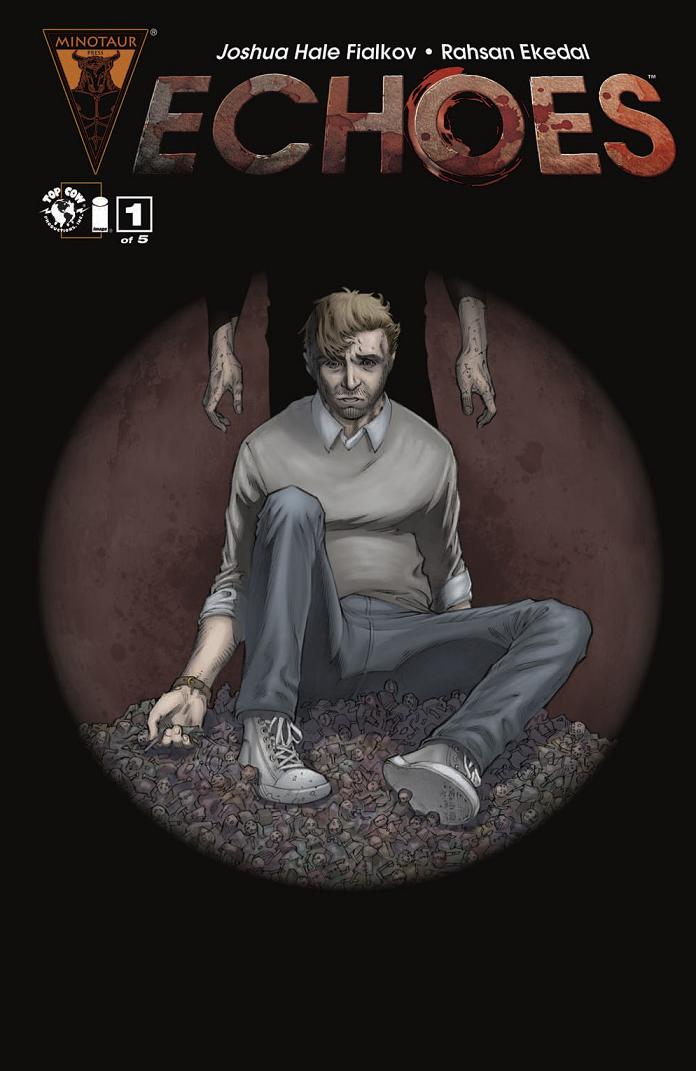 Hey folks, Ambush Bug here with an extra special interview with one of my favorite writers in the biz, Joshua Hale Fialkov. Fialkov exploded onto the comics scene with his haunting ELK’S RUN which knocked my socks off even though it had a rough time getting the complete story to print with multiple publishers going under before the entire story was printed. After that, Fialkov upped his game with a gorgeously noir tale of a detective taking on his last case in TUMOR. Now, Fialkov is wrapping up his latest miniseries, ECHOES, from Top Cow. The final issue hit the stands yesterday and while Fialkov prepares to issue the trade of the book, he took a few moments away from his work to talk with me. Here’s what transpired…
Hey folks, Ambush Bug here with an extra special interview with one of my favorite writers in the biz, Joshua Hale Fialkov. Fialkov exploded onto the comics scene with his haunting ELK’S RUN which knocked my socks off even though it had a rough time getting the complete story to print with multiple publishers going under before the entire story was printed. After that, Fialkov upped his game with a gorgeously noir tale of a detective taking on his last case in TUMOR. Now, Fialkov is wrapping up his latest miniseries, ECHOES, from Top Cow. The final issue hit the stands yesterday and while Fialkov prepares to issue the trade of the book, he took a few moments away from his work to talk with me. Here’s what transpired…AMBUSH BUG (BUG): OK, let's start with the basics. What can you tell the readers about ECHOES and where did the idea come from?
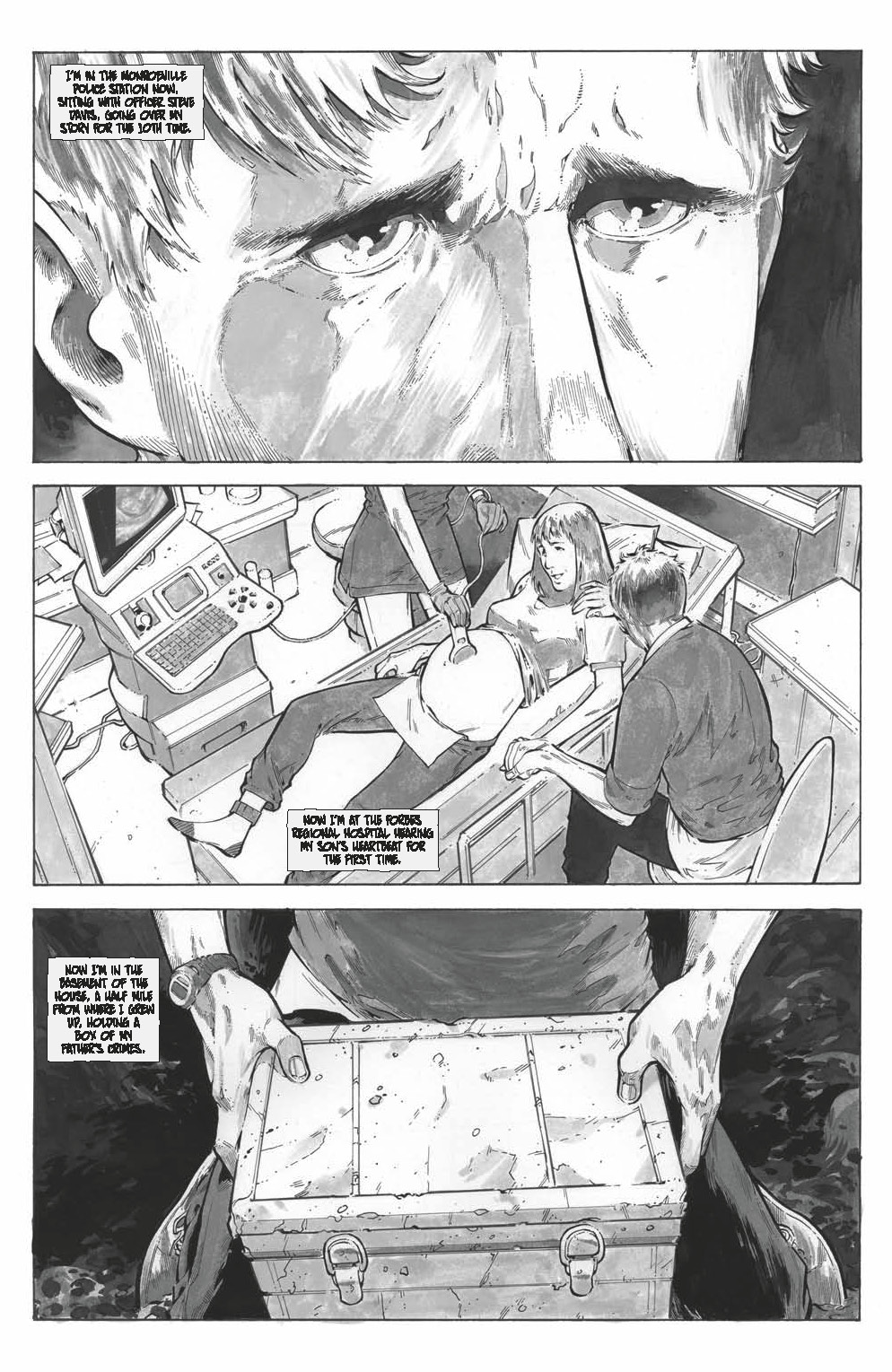 JOSHUA HALE FIALKOV (JHF): ECHOES is my new graphic novel from Top Cow/Image and their Minotaur Press imprint. It's about a guy with severe schizophrenia who finds out from his father on his death bed that his father may have been a serial killer. This sends him on a downward spiral coming to terms with what this genetic link means to him. And then the murders start up again and our hero isn't sure if he's the one doing it or not. So, y'know, a light romantic comedy.
JOSHUA HALE FIALKOV (JHF): ECHOES is my new graphic novel from Top Cow/Image and their Minotaur Press imprint. It's about a guy with severe schizophrenia who finds out from his father on his death bed that his father may have been a serial killer. This sends him on a downward spiral coming to terms with what this genetic link means to him. And then the murders start up again and our hero isn't sure if he's the one doing it or not. So, y'know, a light romantic comedy.The book came out of my own fears about becoming a first time dad. You worry about just what you're 'infecting' your kid with, from genetics to bad habits to the accidental slips of the tongue, and this was just sort of the natural extension for that if you have a sick mind like mine.
BUG: I definitely noticed the attention given to the father/son relationship in ECHOES. Do you think becoming a new father has changed the way you write? Congratulations, by the way!
JHF: Thanks. It changes everything. Having a kid is every Hallmark card you've ever imagined, plus every fear and nightmare. It's tough to talk about it as a writer, because you're trained to not use cliches, and yet, every feeling a person has for their child is pure cliche. But, that also opens up a whole new set of fears and horrors. It also all but guarantees my wife won't read anything I write until the baby is in college.
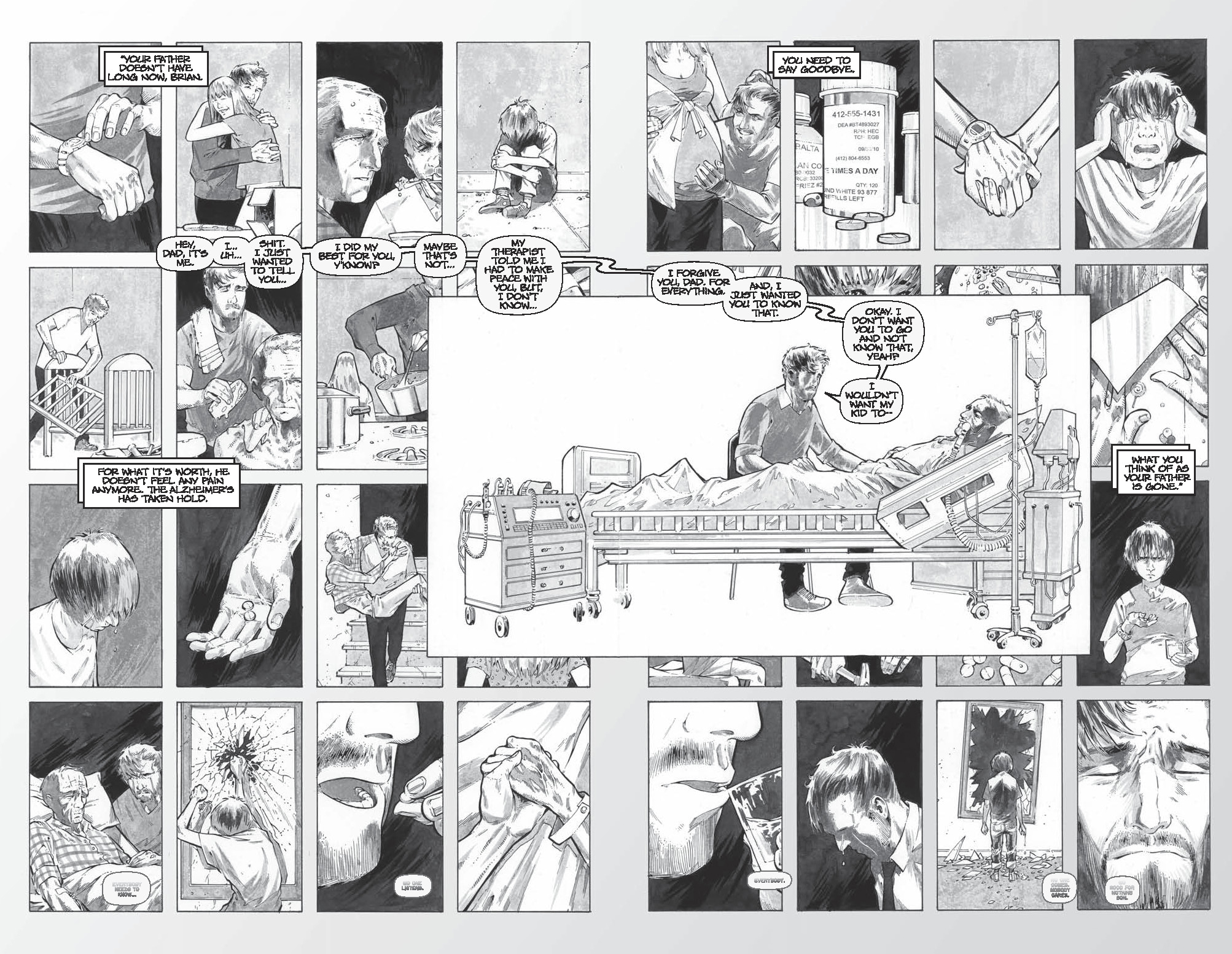 BUG: Ha! So having read ECHOES I know it's an emotional journey for the main character in terms of his own sanity. What kind of research goes into getting into the mind of a person suffering from schizophrenia?
BUG: Ha! So having read ECHOES I know it's an emotional journey for the main character in terms of his own sanity. What kind of research goes into getting into the mind of a person suffering from schizophrenia?JHF: I'm lucky in that my dad is a psychiatrist, so it started with a lot of conversations with him, and then he sent me a few books to read, and, most importantly, a stack of journal articles that were schizophrenics writing about their own illness and recovery while experiencing it. So, it was like journal articles watching them go from crazy to sane. So, y'know, you just do that, only backwards.
I've also known a lot of very, very crazy people and seen them have these breakdowns. My wife thinks I'm a magnet for crazy people. And I'm talking about everything from bipolar disorder to drug problems to post traumatic stress. Watching a friend that you cherish and love turn into a monster because of the voices in their head is not something you forget.
BUG: Let's talk a little about the art. In the past, you've worked with artists who are a bit more expressionistic. Why the shift in tone in artists for ECHOES and where did you find the talented Rashan Ekedal?
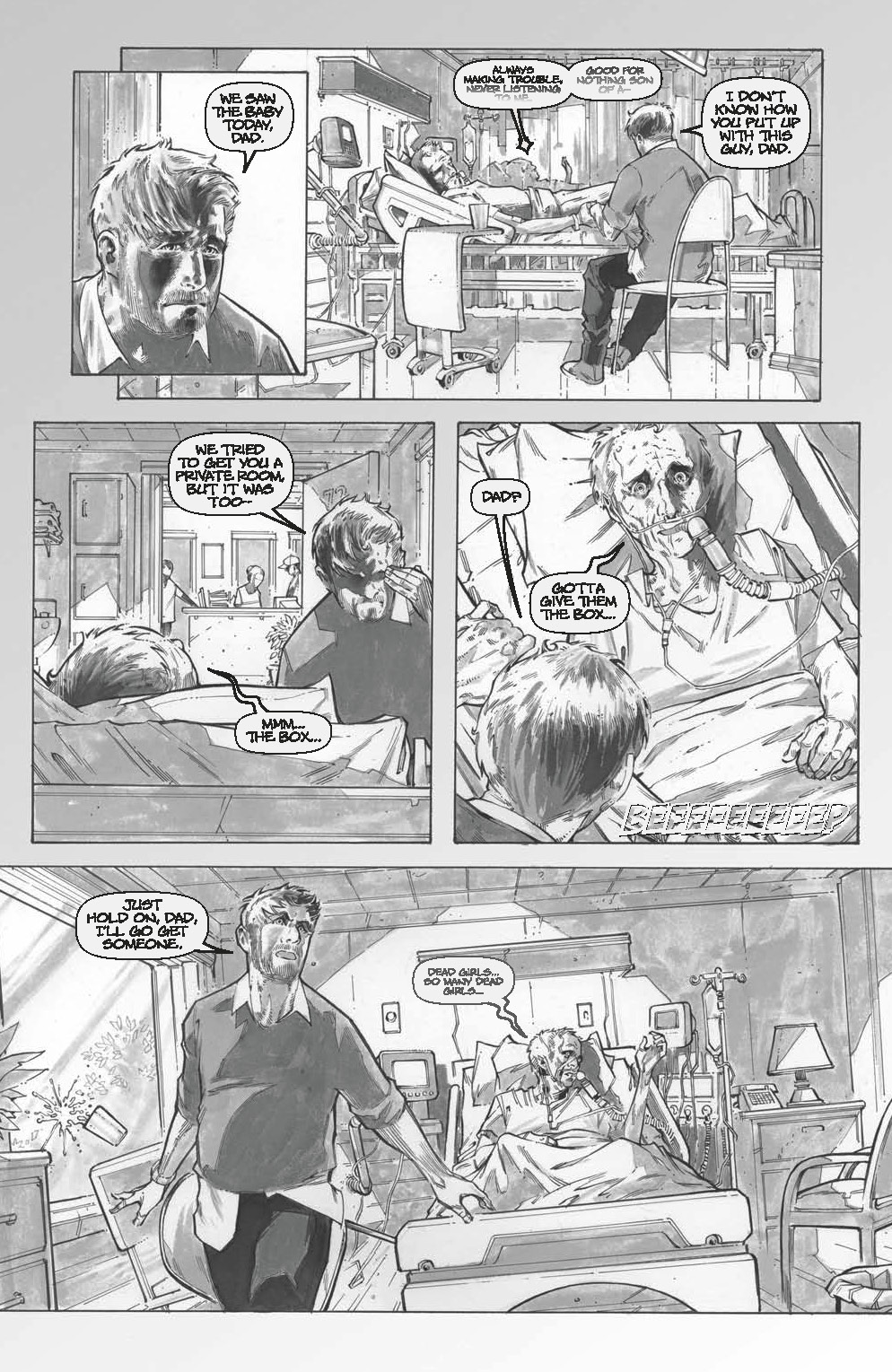 JHF: Rahsan and I worked together on THE CLEANERS over at Dark Horse, but, that was a book I was more of a facilitator than a writer of, so we didn't actually get to do much together. We reconnected a year or two ago, and worked on a tie in comic for THE CRAZIES movie, also published by Top Cow. While working on that, it became abundantly clear how much we had in common, and how much are tastes crossed over. I'd been sort of gumming my way through ECHOES the whole time, and he just felt like such a perfect fit.
JHF: Rahsan and I worked together on THE CLEANERS over at Dark Horse, but, that was a book I was more of a facilitator than a writer of, so we didn't actually get to do much together. We reconnected a year or two ago, and worked on a tie in comic for THE CRAZIES movie, also published by Top Cow. While working on that, it became abundantly clear how much we had in common, and how much are tastes crossed over. I'd been sort of gumming my way through ECHOES the whole time, and he just felt like such a perfect fit.I actually think Noel (from TUMOR) and Rahsan have a lot in common style wise. They're both really wonderful actors, in that their characters feel alive and real. Noel's stuff has a big more of a frenetic energy to it that I think works beautifully on my looser stories, but, with Rahsan, I can tell tight, metered stories that rely on clarity and detail.
Honestly, it's a gift that I get to work with such a wide range of styles of artists and even more so that they're all completely fucking amazing.
BUG: Do you usually have an artist in mind before you start writing? I guess, what I'm asking is that once you know who the artist is for a story, how much does that influence your writing, because I wrote in my review that it seems like you trusted this artist a lot to tell some of your story in silent panels?
JHF: Oh a huge amount. Knowing what your collaborators are capable of, and what they excel at, completely changes the execution, and sometimes even the project itself. I've found that's one of the big stumbling blocks a lot of guys starting out in comics make. They have their script, and they have their set mind of how it should be, and then when the artist comes in with something new they freak out.
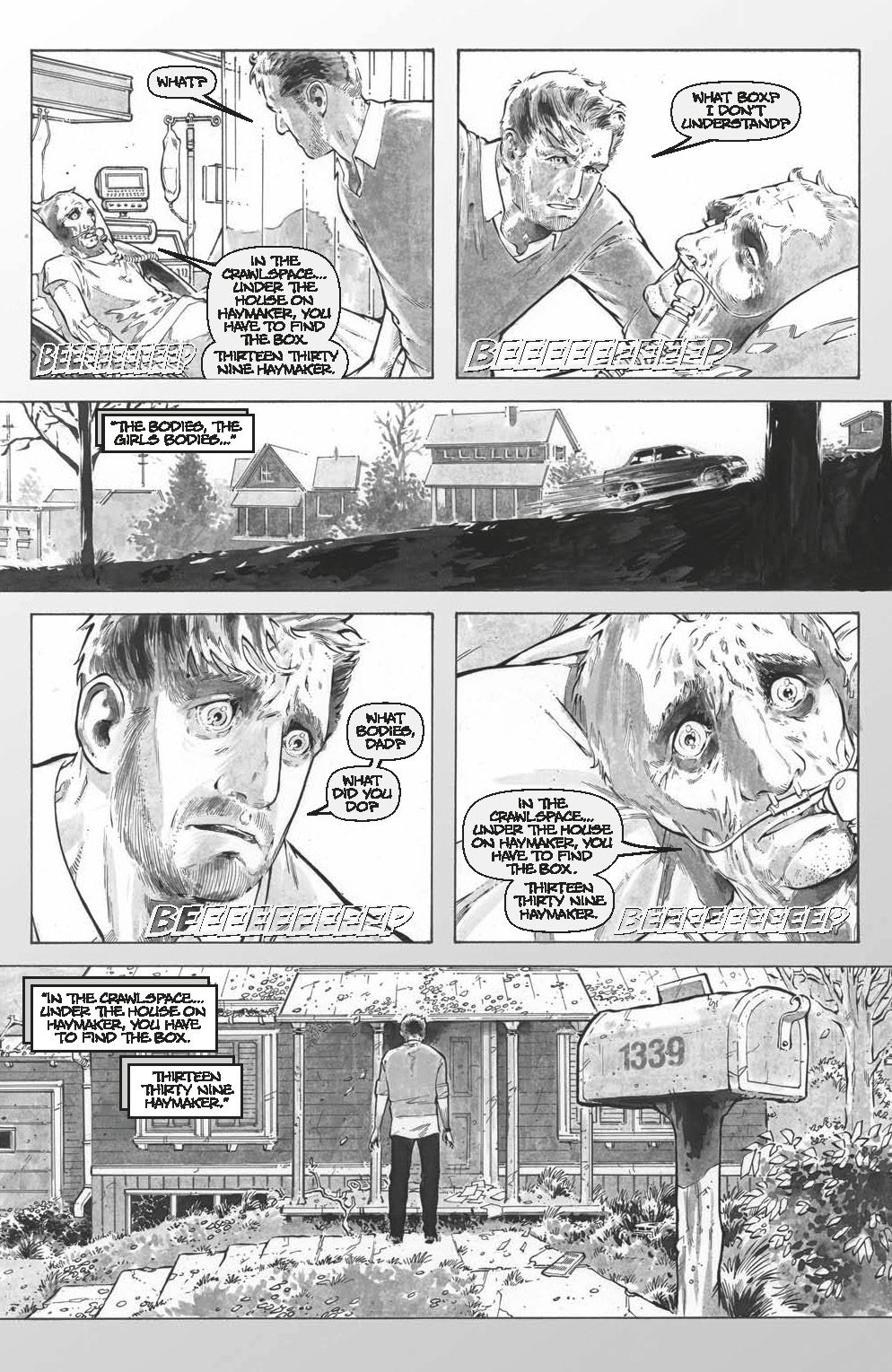 The thing that's truly wonderful about comics is that it couldn't exist without all of the people involved. You're all relying on each other like a really tight jazz band. We follow each other, and sure, there's a bandleader, but, you're still being drawn along with the song.
The thing that's truly wonderful about comics is that it couldn't exist without all of the people involved. You're all relying on each other like a really tight jazz band. We follow each other, and sure, there's a bandleader, but, you're still being drawn along with the song.And Rahsan, as far as I'm concerned, is Thelonius Monk and John Coltrane in one. When I do my final pass on the script for lettering after seeing Rah's art, I tend to remove dialogue rather than add, and that's a huge compliment to him.
BUG: Let's talk a little bit about horror itself. Most of the work I've read from you has some kind of horrific elements to it. What's your secret to constructing a good horror scene in comics? It seems like it's harder than one would think.
JHF: Well, first off, the stuff that most folk think of as horror isn't really what I think of as horror. I mean, sure, I love NIGHT OF THE LIVING DEAD and BRIDE OF FRANKENSTEIN and FRIDAY THE 13th and HALLOWEEN and on and on. But, they aren't really scary. TEXAS CHAINSAW MASSACRE. That's scary. That's real...ish. I think you look at LAST HOUSE ON THE LEFT or I SPIT ON YOUR GRAVE or even PSYCHO, and what's scary is that these are just fucked up, demented people doing what they do, and there's no rhyme or reason.
That's what I'm scared of. I'm scared that I'm gonna flip off the wrong guy and he's gonna murder my family. That's scary shit because it can happen to you. So, I tend to look at my stories and characters from that prism. What's the worst thing that could possibly happen to a guy with these circumstances? Like I said before, I can almost guarantee you'll see more kids showing up in my work, because having something happen to my daughter is about the worst thing I can imagine.
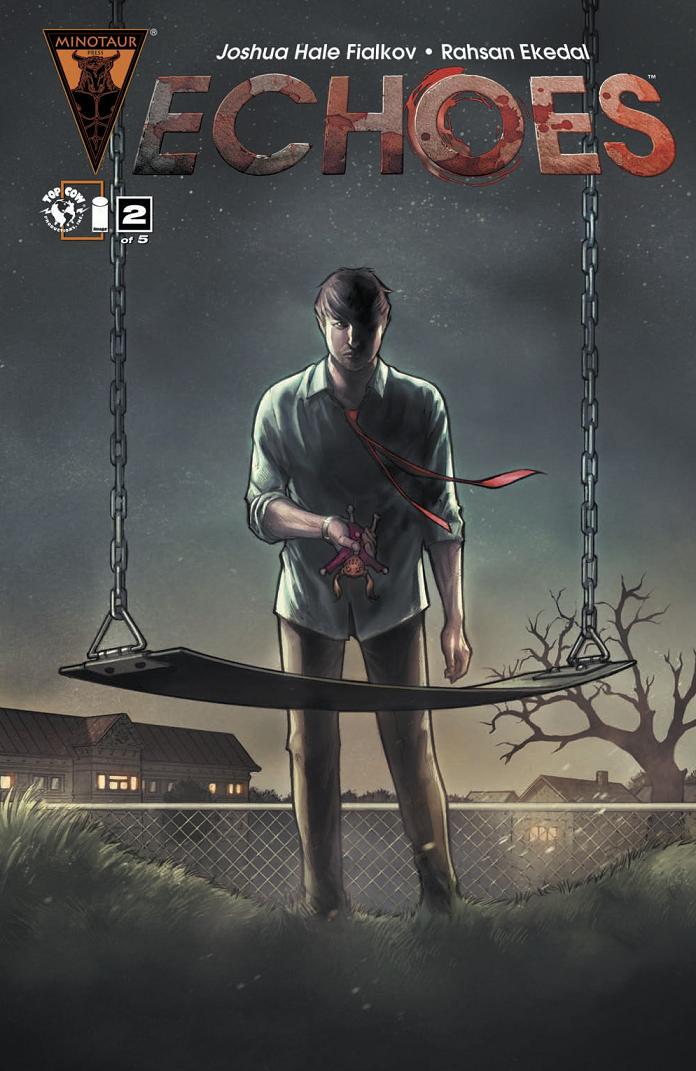 Finding a way to make horror personal and real is something that you're almost forced to do in comics, because unlike in film, you don't have the noises and quick cuts to make people jump. Instead you have to get under their skin and wiggle around.
Finding a way to make horror personal and real is something that you're almost forced to do in comics, because unlike in film, you don't have the noises and quick cuts to make people jump. Instead you have to get under their skin and wiggle around.BUG: Back to ECHOES. A lot of the struggles your characters face are internal. In ECHOES, the main character spends a lot if time scrutinizing his view of reality. In a different way, the main character in TUMOR's perception of reality & the order of events is suspect. Even in ELK'S RUN the main character's own reality is challenged when he's tempted by the world outside Elk's Run. What is it about this theme that interests you and makes you keep returning to it?
JHF: I'm really hung up on perception versus reality. Part of that comes from the fact that I get into fights with people all the time over, well, just that. How each of us sees the world, our actions, and how those two things interact is so singular and so subjective, that a lot of drama comes from it. A lot of fiction comes from a place of characters making unlikely decisions, I'd rather have characters make rational decisions that suit their needs but miss the greater purpose.
I mean, you can have an unreliable narrator who doesn't know he's unreliable. Think about when you have a bad break up. There's very few people in the world who think, "Man, I sure was the asshole here." Most people turn the other person’s actions (or inactions) into a complicated web of justifications and motivations. How many times have you had a fight with a friend or co-worker over what you perceived them to have done, versus what they actually did? That's something that every person understands, and I think, beyond that, we all are so terrified of having the wool pulled over our own eyes that we don't notice that most times we're the ones doing the pulling.
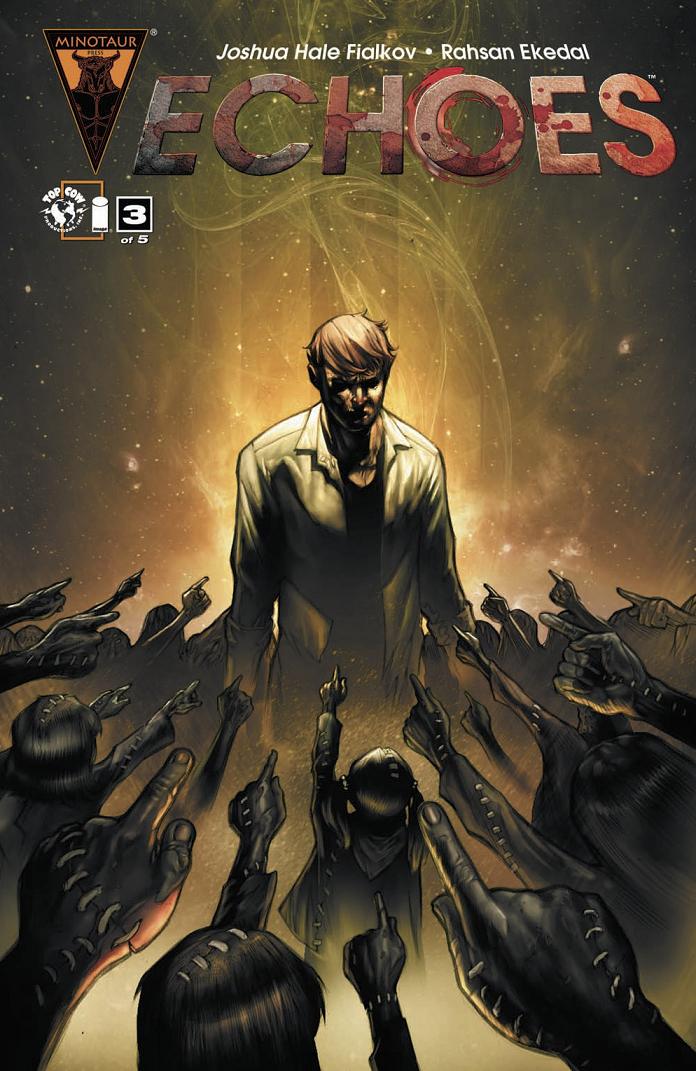 It's also just such a noir conceit, y'know? Noir is all about characters unwilling to accept the circumstances and fighting to change their status. Part of that comes from perception and self-awareness, and that's the part that a character actually has some power over.
It's also just such a noir conceit, y'know? Noir is all about characters unwilling to accept the circumstances and fighting to change their status. Part of that comes from perception and self-awareness, and that's the part that a character actually has some power over.BUG: You've had a pretty interesting career in comics so far. With the problems after ELK'S RUN's distribution and being the first comic solely available on Kindle, what have you learned about the comics industry from the positives and negatives? Has it been easier this time around with ECHOES and Top Cow's Minotaur line?
JHF: You know, it never quite gets easier. I think finding an audience gets slightly less... worrisome, but, there's always a fight doing something as different from the rest of the industry as I do. With ECHOES, we found our audience a bit too late. A lot of people were like you, fans of mine or of psychological horror who just plain didn't know the book existed. So, y'know, on the one hand we've got just a huge swath of vocal passionate fans... on the other hand, they're pretty much all we have.
And frankly, that's been my experience for the past ten years. And, y'know, that number is steadily going up, but, not necessarily at the sort of numbers needed to actually convince publishers that my little dark, black and white, angry horror noir comics have a place in the industry.
And maybe that's because they don't, and I'm too much of a fool to walk away. That being said, I've had so many readers seek me out and really just confess my books as a huge inspiration to them, which sounds conceited for me to say, but, in fact, it's the thing that gives me hope. I keep doing what I do, and keep relying on people like yourself to shout about it until enough people listen.
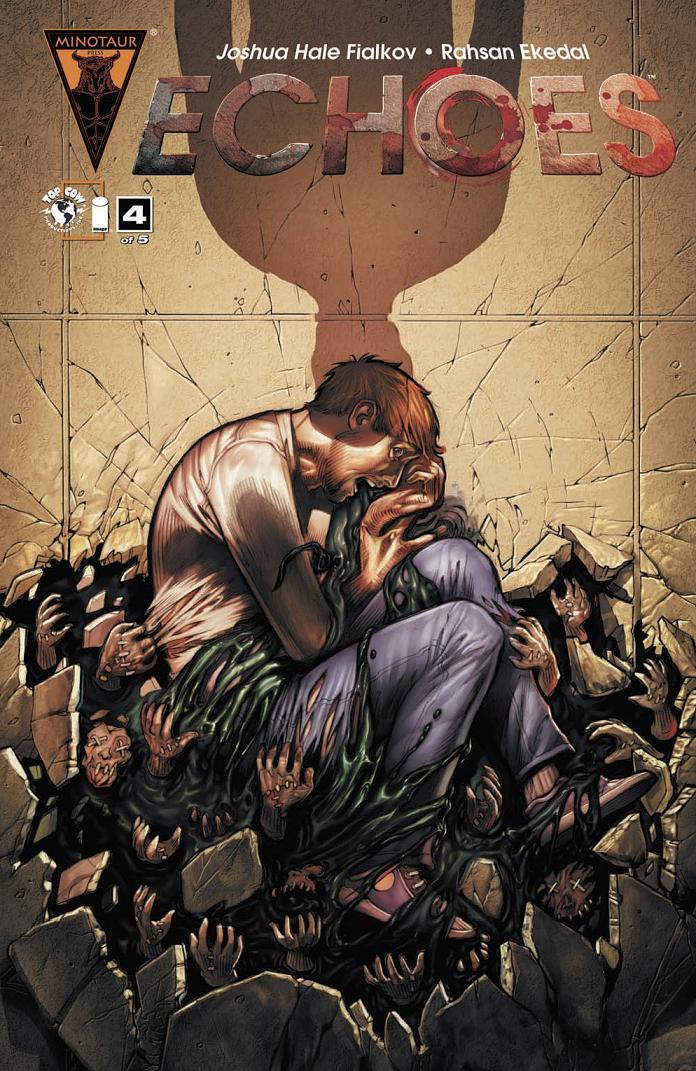 BUG: Well, I sure hope you don't go anywhere. So now that you're wrapping up ECHOES, it'll be collected into trade, right? Does the struggle of single issues tempt you to just do it all as a larger sized graphic novel and cut out the floppies?
BUG: Well, I sure hope you don't go anywhere. So now that you're wrapping up ECHOES, it'll be collected into trade, right? Does the struggle of single issues tempt you to just do it all as a larger sized graphic novel and cut out the floppies?JHF: Yep. We're doing a fancy hard cover collection like we did for TUMOR last year. It'll be around two hundred pages with a ton of extras and beautifully designed to match up with TUMOR size wise, too. In theory, anyhow. That hard cover is actually available for pre-order right now from Image/Top Cow for $19.95, which is a helluva deal, if I do say so myself.
Top Cow and I talked a lot about the issues vs. trade, or digital to trade model...but here's the thing...digital’s not there yet. It will be. It'll be a huge percentage of the market...eventually. But right now, it's not there. And with a book like ECHOES having great word of mouth is how you sell the trade...so then how do you do that? Do you release it for free digitally? Sure, but then it gets devalued, right? So, you get the sales you can (which always at least cover cost of printing, if not also a bit of the creative costs as well) and take all of that grass roots support into your collection to really get people on board and talking about it.
It's mercenary, and a bit sad, but it is what it is, y'know? The business of comics is a nuclear waste dump right now, and all we can do is try to step in between the small explosions. I try my damndest to make comics that work in every format you're going to experience them in, and that's about the best I can do in this market.
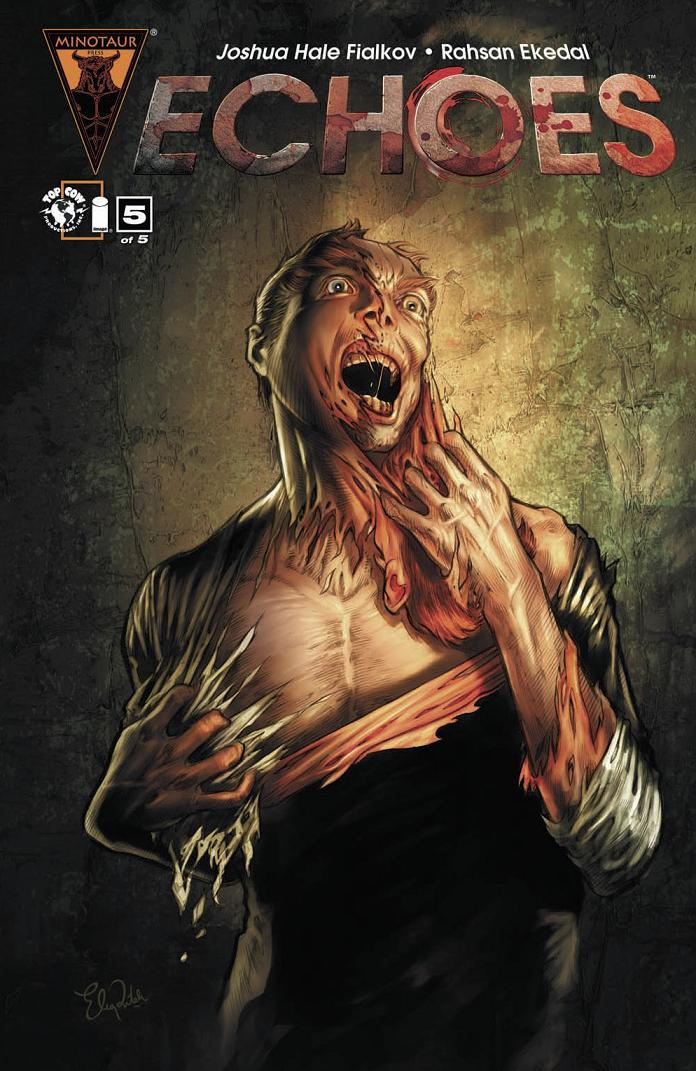 BUG: So interesting. When you are writing, do you find yourself distracted with the question, "Is this something that's going to sell?" I guess what I'm asking is if the business end of the well...business sometimes gets in the way of the creative process?
BUG: So interesting. When you are writing, do you find yourself distracted with the question, "Is this something that's going to sell?" I guess what I'm asking is if the business end of the well...business sometimes gets in the way of the creative process?JHF: Sure, that's part of it. I mean, I'd like to say that I'm an artist telling the stories that shake the core of my being, and I let my compass be my guide, but, the reality is that I've got a family and this is how I make a living. Although, truth be told, it has less to do with comic sales and more to do with sort of a cross-media thing. What's a book that'll get attention in the comic market than can also be made into a film that uses the collaborators I have available in the best way possible?
I think about what i do as being a chair builder. Sure, it can be a beautiful chair, a chair like no chair you've ever seen before, but, at the end of the day, you have to be able to sit in it, it has to not fall over, and somebody has to want it in their house. If I can't do those things, then I'm not doing my job.
The difference between comics and the mercernariness of Hollywood, though, is that you can make much weirder and idiosyncratic things with much less resistance in comics.
BUG: So folks don't miss out on your next project, what's next for you?
JHF: Well, I'm writing a three issue arc of SUPERMAN/BATMAN for DC that's a noir-stravaganza. I can't believe the things they let me do in this book. As far as my own stuff, I've got brands new PUNKS comics launching over at geek.mtv.com as well as an original graphic novel with the amazing Steve Bryant called HELLTOWN.
I'm also working on my first ongoing series with an artist named Brent Peeples that'll be out from Image later this year. That one's a big departure for me, and way more mainstream than the rest of my stuff. It's my attempt to prove I can make things go boom, too.
Plus, Rahsan and I are working on a follow up, as are Noel and I for TUMOR. So, lots coming, not a lot to explicitly talk about.
 So, if you want to follow me and what I do, there's my blog that has a weekly writing column on it and updates, then there's my twitter @joshfialkov and my Facebook fan page. Join/Follow/Subscribe any of those and follow along with what I'm up to.
So, if you want to follow me and what I do, there's my blog that has a weekly writing column on it and updates, then there's my twitter @joshfialkov and my Facebook fan page. Join/Follow/Subscribe any of those and follow along with what I'm up to.BUG: Awesome. Well, here's your last chance: why should folks be sure to seek out ECHOES?
JHF: Support stuff that takes risks. You've bought all those other books before. And, yeah, they're great and they scratch an itch, but, still, try something different. Just once.
Plus, you can read the whole first two issues online for free here!
BUG: Well, I'm sold. Thanks so much for taking the time for this interview. Best of luck with ECHOES!
JHF: Thanks so much, Mark!
BUG: Be sure to check out my very positive review for the entire ECHOES miniseries here. ECHOES #5 hit the stands yesterday from Top Cow, but if you missed the series, the ECHOES Hardcover is in this month’s Previews and is available for order now! Be sure to tell your comic shop to order this excellent story!
Ambush Bug is Mark L. Miller, original @$$Hole/wordslinger/reviewer/co-editor of AICN Comics for over nine years. Support a Bug by checking out his comics (click on the covers to purchase)!


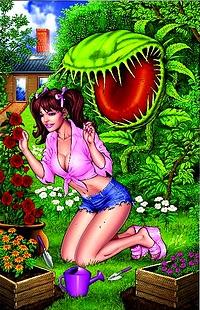
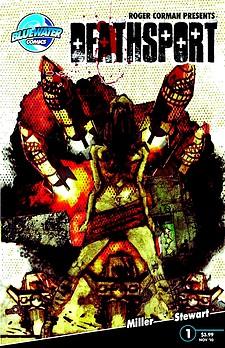
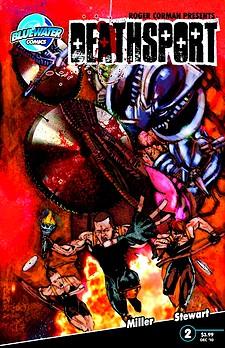
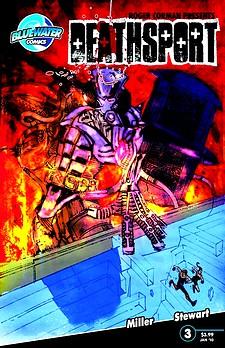
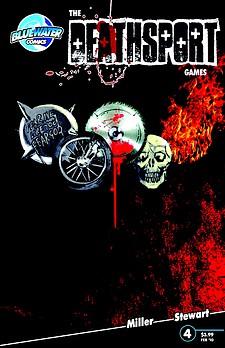
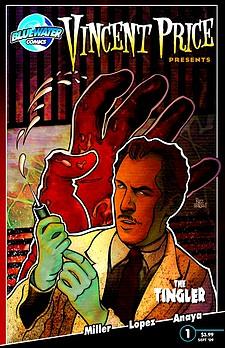
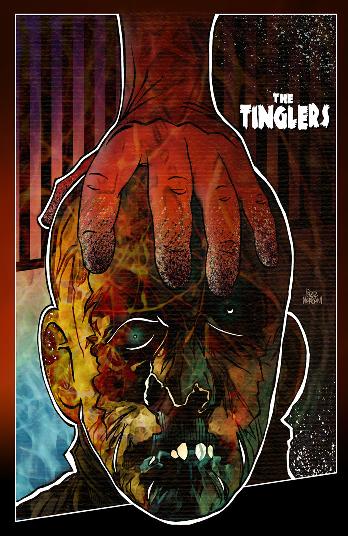


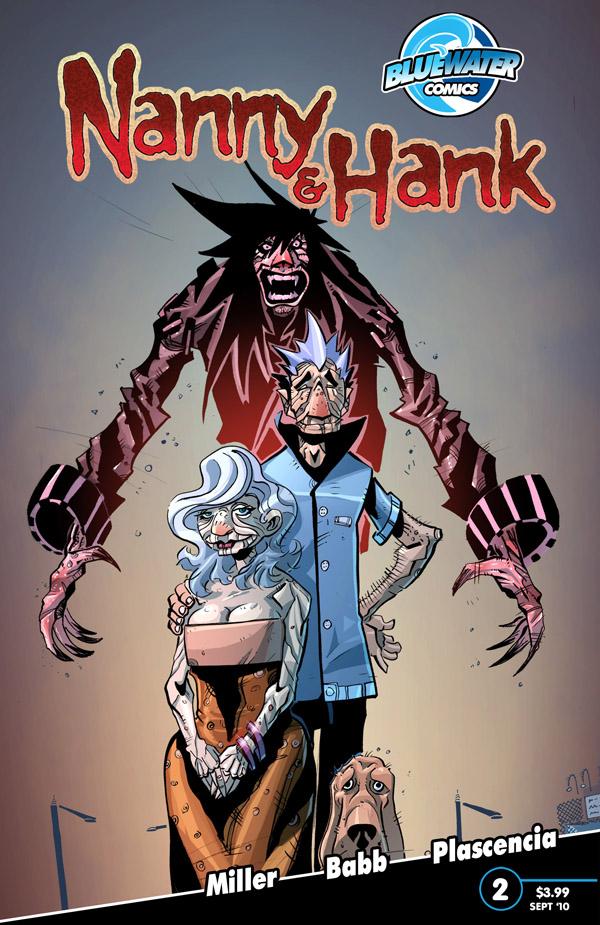
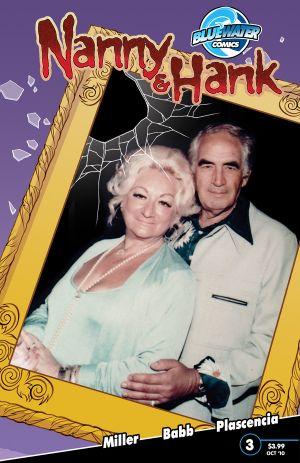
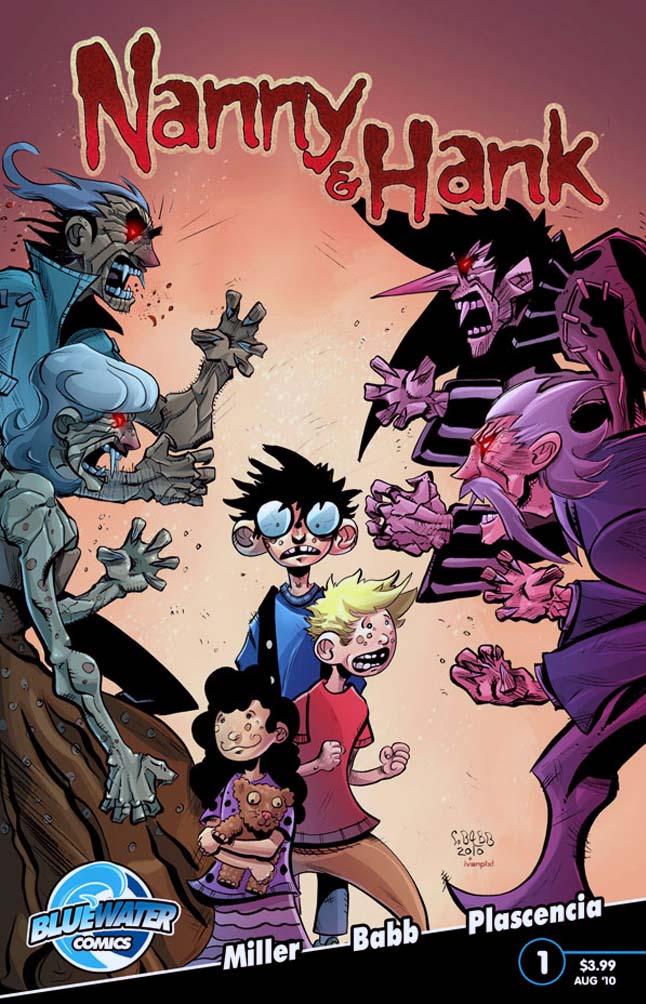

Check out THE DEATHSPORT GAMES’ Facebook Page
Proofs, co-edits & common sense provided by Sleazy G
